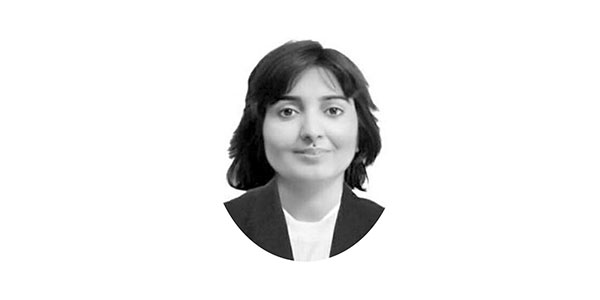Split up patriarchy, not country
HISTORY lauds Benazir Bhutto as Pakistan’s first woman Prime Minister to lead the country in the Islamic region.
Women has remained custodian of the house of the Provincial and National Assembly in Pakistan.
Similarly, a woman has held the position of Foreign Minister of Pakistan. Moreover, women are serving in key posts as Judges, Governors, diplomats, politicians, commissioners, aerospace engineers, and fighter pilots.
They are working as architects, entrepreneurs, tech leaders, athletes, mountain climbers, members of the bomb disposal squad, social activists, and peace leaders.
Recently, the renowned mountain climber of Pakistan has made a dazzling addition to the daring women in Pakistan by reaching the summit of the fierce mountain – K2.
Ingenuously, it is one side of the picture. In reality, the issue is not with the women’s talent but with the hindrances that patriarchal societies put in their way.
The issue is that despite having the potential, the ratio of women in the above-mentioned fields is very less.
They have brilliant minds but they are not given opportunities. They come forward most often by breaching the taboos or deviating from the patriarchal norms and standards.
There is a need to open all arenas for women to stand and walk with the ongoing developing world.
Recently, The World Economic Forum’s report on the global gender gap ranking Pakistan as the second worst country for women was not apprehensive and distressing when we are aware of the other side of the picture; the happenings in our surroundings.
One day, women are barred from entering picnic places in their own country with a dangerous fallacy to believe that it is against tradition, and vulgar.
On another day, a foreign woman tourist is sexually abused, and before that, a foreigner female employee of an international organization in the capital was raped by the Pakistani guard.
Adding more, a Pakistani woman was gang raped while boarding in train. Sometimes, they are chopped or boiled for not obeying the men.
Noor Mukadam’s murder in daylight adds more to put Pakistan in deterioration. Patriarchal men decide women’s fate, no matter, whether their decisions against women are above the rule of law.
Women’s rights, fundamental freedom, dignity, and worth as a person are mere phrases and words in Pakistan creating a challenging scenario for stakeholders to oppose this male power configuration, underlying gender inequality, and hierarchy.
The World Economic Forum index further shows women lagging behind in economic spheres, political empowerment, and health facilities in Pakistan bringing a shameful situation for the agents of the state, its institutions, and ruling bodies.
Predators are everywhere and in diverse forms. Teen abduction is common which condenses the dream of becoming an independent woman in Pakistan into a fantasy.
Women experience physical and sexual violence which most often goes unreported due to the least awareness of laws and education.
Patriarchy seeks to have irresistible control over women, and in their hands, women suffer character assassination, harassment at work and in public places, and red-tapism in the justice system.
Often, they are reduced to objects by calling them butterflies, beauty pageants, and peahens.
The reason is quite evident that their ratio in law making and law enforcement institutions like legislation, police, and courts is fewer.
The condition is worse for women in technical and other professional fields. Feminists who dare to speak in favor of all other women’s rights without fearing the consequences are labeled as rebels, and socially outcasts.
Since feminism is the advocacy of women’s equal rights to men in all spheres of life, it seems irrelevant in Pakistan, where they are categorized as western agents and apostates too.
They are taken as a threat to patriarchal authorities while challenging their taboos and violating their set parameters.
Alarmingly, the worse conditions for women are not limited to the country of Pakistan but across Wagah, and Torkham Border, the countries carry the same conditions for women, which puts the whole belt on the verge of degeneration.
However, it is not rational to put a full stop instead of making conditions better by developing safer public places, and a conducive working environment for women.
Similarly, there is a need to empower them with the help of education, by creating more job opportunities in all fields either it is economic, political, or social.
There is a need to fill the lapse by bringing women members into Advisory Councils, leadership positions, directors, and other executive posts.
There is a need to bring a shift in the overall attitude towards women. Talking about the health facilities for women in Pakistan, there is a need to start information campaigns as most of the mortality rate among women is the result of ‘complications in pregnancy and child birth’ and cancer.
They do not know how to reach the right doctor at right time, and most often they do not have the economic resources to pay the doctor.
Hospitals are burdened with the flux of people clearly indicating that there is a need to control the rate of increasing population.
The government needs to equip the hospitals with an advanced infrastructure to meet the needs.
Hostile incidents against women continue as a legacy of patriarchy. There is a need to make decisions dialogued by both genders, governed by reason, and sustained by the ideologies of respect.
Abuses on women are neither sanctioned by any religion nor by rule of law. Bringing women to work is the key to success.
Further, all political and social stakeholders need to work for the empowerment of women, and end sexism bearing in mind that denial will lead to chaos only.
—The writer is Lecturer in English Literature at GC University Faisalabad.










